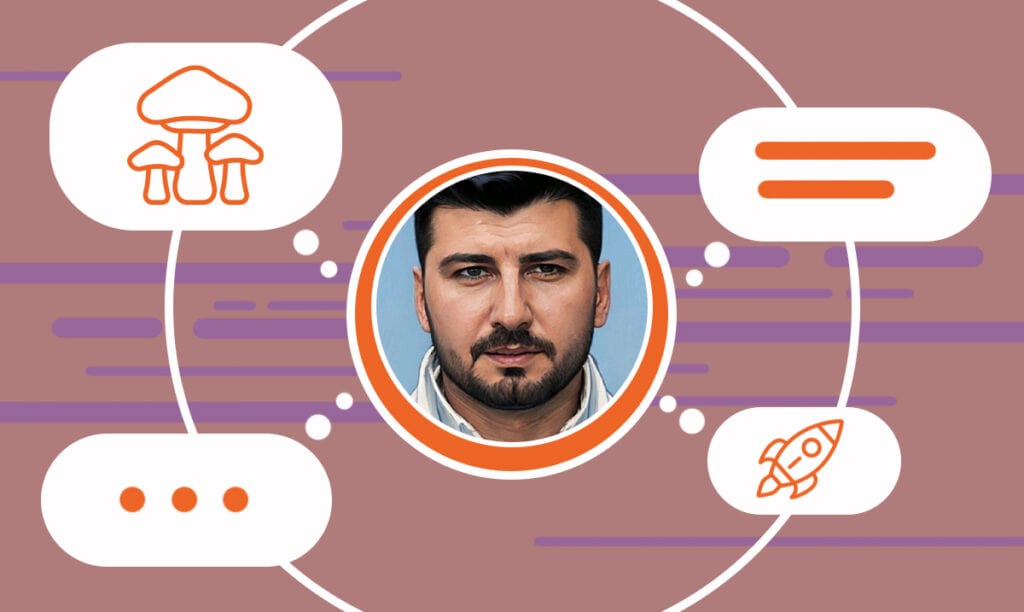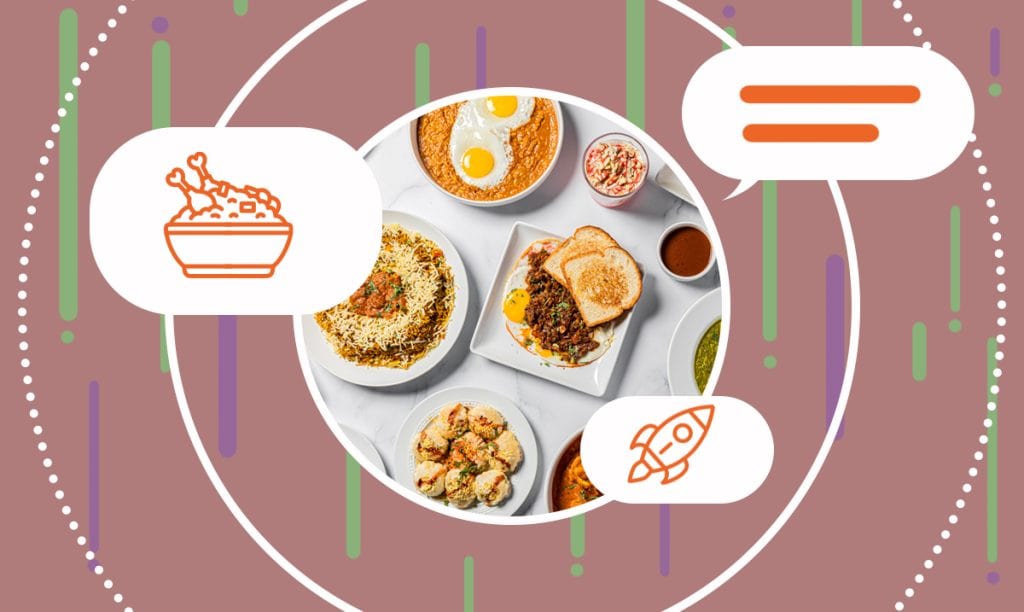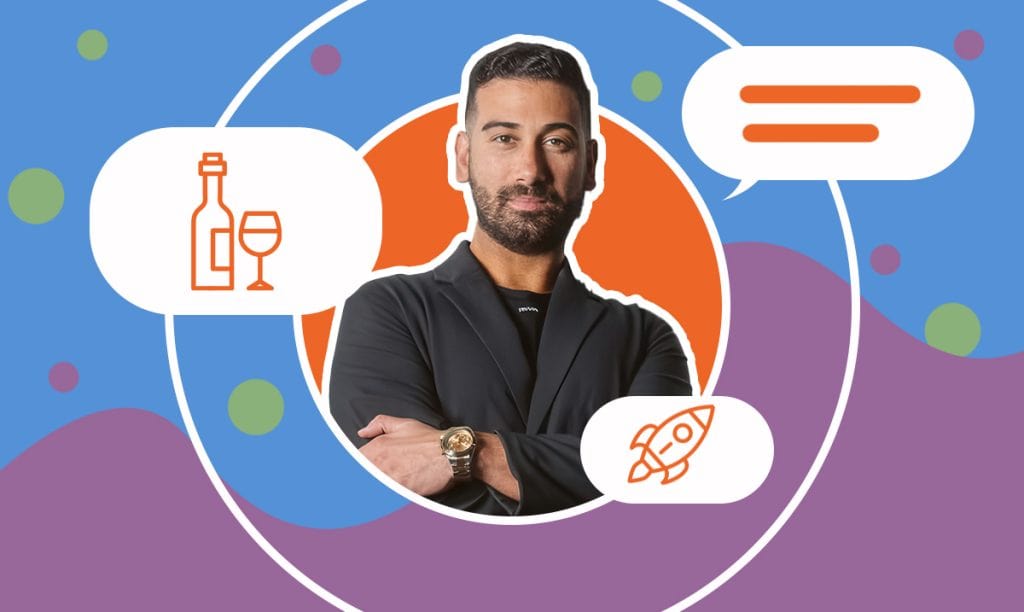In this interview, we sit down with Raimonds Selga, co-founder and board member of Kalve Coffee, a fast-growing specialty coffee brand based inLatvi ...
How to Build an Urban Mushroom Farm with Solomon Ibragimov
Written by: Esther Strauss
Esther is a business strategist with over 20 years of experience as an entrepreneur, executive, educator, and management advisor.
Published on March 21, 2024

In this interview, we delve into the fascinating world of organic mushroom cultivation with Solomon Ibragimov, the chairman and co-founder of Mushroom Direct. Based in the heart of Queens, New York, this innovative urban farm is not just about growing mushrooms; it’s a story of passion, sustainability, and the pursuit of health.
Join us as we explore how Mushroom Direct is revolutionizing the way we think about functional foods, their journey in the competitive world of agribusiness, and the cutting-edge strategies they use in e-commerce and digital marketing. Prepare to be inspired by Solomon’s unique insights and the future of organic food.
Background and Inspiration
SBS – What inspired you to start Mushroom Direct?
Solomon – Our inspiration for founding Mushroom Direct stems from the visionary Dr. Anatoliy Rokhvarger, a renowned mentor and business partner acknowledged as one of the top innovators of the 20th and 21st centuries. Approximately five years ago, Dr. Rokhvarger approached our team, presenting a collection of patents he had invented. Although his inventions weren’t directly related to agriculture, they ignited a paradigm shift in our thinking. One of his notable inventions was a thermo-chemical method for processing waste, showcased in this video.
This revolutionary method allowed us to generate energy from waste, leaving no byproducts. Despite its success, we faced challenges when attempting to implement it for waste management due to market dynamics. The energy prices in our active markets were low (four cents US), resulting in a projected return on investment of 10 years, making it not feasible for investment without external support such as grants and government backing.
Realizing the need to pivot, we decided to reverse engineer our approach, starting with the end-use cases for the produced energy. Instead of focusing on waste management, we concentrated on finding energy-consuming cycles that could benefit from our technology. This led us to explore hyper-local food production, particularly in vertical farming, as a viable application. However, the cost of energy remained a significant barrier.
The breakthrough came when we identified mushrooms as a strategic focal point. Our team shares a passion for organic, functional mushroom species, and the nature of mushrooms as super connectors resonated deeply with us. Much like the stealthy mycelial networks beneath the ground, our waste-to-energy process operates quietly until it bears fruit, allowing us to spread the benefits throughout the ecosystem.
By building our waste management systems backward and prioritizing the “users of energy” first, we’ve established Mushroom Direct with a mission to revolutionize sustainable agriculture through innovative energy solutions.
Product Development
SBS – How did you decide on the specific types of mushrooms to cultivate and sell?
Solomon – Selecting the specific strains of mushrooms for cultivation and sale involved a thoughtful and multifaceted decision-making process. Firstly, we considered our team’s expertise in indoor cultivation, ensuring that the chosen strains aligned with our capabilities. Unlike Porcini or Morel mushrooms, which are typically foraged in forests and not conducive to indoor growth, we focused on varieties that thrive in controlled, sterile conditions.
While acknowledging the culinary appeal of Porcini and Morel mushrooms, we recognized the challenges associated with wild mushrooms, such as the time-consuming cleaning process and the potential alteration of their natural texture through soaking. These concerns are particularly pertinent in kosher kitchens, where meticulous food preparation is essential.
Our approach emphasizes growing mushrooms indoors, free from bugs, and under stringent sterile conditions, utilizing the highest quality organic ingredients. This not only ensures the purity of the product but also addresses the challenges associated with wild foraging.
In addition to aligning with our cultivation capabilities, we closely monitored market trends to guide our selection. Mushrooms like Lion’s Mane, known for their medicinal benefits, have gained significant popularity. Our product portfolio encompasses strains that cater to the growing demand for medicinal mushrooms and offer a delightful culinary experience. Each strain we cultivate has been carefully chosen not only for its health benefits but also for its exceptional taste, making them a gourmet delight for our customers. Ultimately, our decision to cultivate specific strains reflects a harmonious blend of our expertise, market trends, and a commitment to delivering high-quality, delicious, and health-conscious mushroom varieties.
Sustainable Practices
SBS – Can you elaborate on your sustainable and circular agricultural practices?
Solomon – Thank you for the insightful question. Our commitment to sustainability is deeply embedded in our agricultural practices, driven by the principles of a circular economy and environmental stewardship.
To begin with, our cultivation of mushrooms starts with the innovative use of upcycled agricultural waste. We utilize materials such as grain hulls, brewery waste, spent coffee grounds, straw, and hardwoods sourced exclusively from entities with organic certification. Rigorous validation processes ensure that these materials are free from toxins, oils, and any other foreign traces, aligning with our dedication to delivering organic and contaminant-free produce.
The sustainability journey doesn’t end with the mushroom harvest. Post-harvest, the spent mushroom substrate, enriched with organic matter, takes on a new life in our eco-cycle. It becomes the nourishment for worms situated on the rooftop of our facility within a controlled environment. These worms play a crucial role in generating castings — an all-natural and potent fertilizer for other plants, completing the first loop of our circular agricultural system.
Moreover, we are currently in the process of implementing chickens into our ecosystem. These chickens, fed with protein-rich worms, not only lay eggs but also contribute natural fertilizer, further enhancing the sustainability of our agricultural practices.
Additionally, on the same rooftop, we have plans to scale up black soldier fly farming. These flies, in their larval stage, will play a pivotal role in the transformation of waste into biofuel, as well as add additional nutrition to the fowl. This will add another layer to our circular economy model.
This comprehensive and evolving circular economy model yields fresh, organic mushrooms while catalyzing the creation of biofuel. The biofuel, generated through the waste of our eco-cycle, can power our farm, closing the loop and realizing the vision of a sustainable and self-sufficient agricultural ecosystem. Through this integrated approach, Mushroom Direct will provide high-quality, organic products and pioneer a transformative model for sustainable agriculture with positive environmental impacts.
Challenges Faced
SBS – What have been the biggest challenges in starting and running your urban farm?
Solomon – Engaging in urban farming is undeniably one of the most demanding endeavors that requires substantial dedication and resilience. The challenges in this industry are multifaceted and extend beyond what is immediately visible. Operating at the highest level while adhering to stringent industry standards introduces complexities that demand meticulous attention.
Identifying a single, overarching challenge is a formidable task, given the diverse and dynamic nature of the hurdles we encounter. However, improper management is a pervasive obstacle that has led many ventures astray. The intricate balance required to navigate operational intricacies, compliance nuances, and the ever-evolving landscape of urban farming necessitates adept and strategic leadership.
Another formidable challenge lies in the realm of financing. Successfully managing an urban farm demands access to substantial capital, whether through self-funding or rapid market penetration. Cautionary advice echoes against blind “spray and pray” models of capital deployment. For those contemplating entry into this business, a judicious approach to capital allocation is crucial. Growing in measured phases and validating entrepreneurial skills before making substantial investments is sage counsel, as reckless spending can swiftly lead to financial strain.
In essence, the challenges in urban farming are diverse, encompassing operational intricacies, compliance demands, and financial considerations. Fostering success in this industry requires a strategic mindset, an adaptive approach to management, and a prudent allocation of resources. As we navigate these challenges, we remain committed to delivering sustainable and high-quality agricultural products to our community. And I can proudly say we are getting better at it with every passing day.
E-commerce Strategy
SBS – How have you integrated e-commerce strategies to market and sell your products?
Solomon – Our approach to e-commerce is strategic and aligns with our current business priorities. While we do have an online store, our primary focus is on maintaining a hyper-local presence and cultivating strong partnerships with local supermarkets and restaurants — established entities that have consistently proven to be loyal customers.
Our decision to prioritize local collaborations is twofold. Firstly, it allows us to leverage existing relationships and cater to the demands of our immediate community. Secondly, it serves as a prudent approach to managing costs, considering the traditionally high cost per customer acquisition associated with online platforms.
Currently, our operational bandwidth is dedicated to fulfilling the demand from our local partners, and we find that our existing network provides more demand than we can readily deliver. As we are in the midst of a strategic scale-up, our immediate focus remains on bolstering our production capabilities to meet the growing demand.
While we acknowledge the potential of direct-to-consumer models through e-commerce, we are reserving a more comprehensive exploration of this avenue for the near future. Post-scale-up, we plan to redirect our attention towards enhancing our online presence and refining our e-commerce strategy. This measured approach ensures that we can capitalize on the online market when the time is ripe, ensuring a more controlled and effective allocation of resources in customer acquisition.
In summary, our current emphasis on local partnerships and delayed focus on direct-to-consumer e-commerce aligns with our overarching goal of sustainable growth and prudent resource management. As we navigate the complexities of the market, our commitment remains steadfast to delivering quality products and fostering lasting relationships within our community.
Customer Engagement
SBS – What methods do you use to engage with your customers online?
Solomon – Our commitment to customer engagement is multi-faceted and extends across various online platforms. We have streamlined communication channels, providing our customers with the ability to message us directly on all our platforms. This ensures a seamless and responsive interaction, and we take pride in our swift response times.
Currently, we actively engage with our audience on Instagram, Facebook, LinkedIn, and WhatsApp. These platforms serve as dynamic spaces for us to connect with our customers, share updates, and address inquiries promptly. Our live presence on these platforms allows for real-time interaction, fostering a sense of community and transparency.
Recognizing the evolving landscape of online engagement, we are also in the process of expanding our outreach to TikTok. This platform offers a unique and vibrant space for creative expression, and we aim to leverage it to build a broader audience and connect with our customers in innovative ways.
Our approach to customer engagement revolves around accessibility, responsiveness, and the utilization of diverse social media channels. By being present across a range of platforms and embracing emerging trends, we aim to not only meet but exceed the expectations of our customers.
Digital Marketing
SBS – How do you leverage digital marketing to reach your target audience?
Solomon – Our digital marketing strategy revolves around the creation and dissemination of compelling content across various social media channels. We take pride in our team’s ability to craft engaging and visually appealing content that resonates with our audience. To experience the depth of our content, we encourage you to follow our business pages on platforms such as Instagram, Facebook, LinkedIn, and more.
By consistently producing high-quality content, we aim to capture the attention of our target audience and foster a genuine connection. This content not only showcases the uniqueness of our products but also communicates our brand story, values, and commitment to sustainability.
In addition to organic content creation, we are actively exploring targeted advertising and promotion strategies to amplify our reach. This includes leveraging the advertising features offered by platforms like Instagram and Facebook to precisely target and engage with our desired audience segments.
Our approach to digital marketing is dynamic and evolves with the ever-changing landscape of online platforms. We understand the importance of staying current with trends and technologies to effectively communicate our brand message and connect with our audience. Through a strategic blend of content creation, organic engagement, and targeted advertising, we strive to not only reach our target audience but also cultivate a meaningful and lasting relationship with them.
Scaling the Business
SBS – What are your strategies for scaling your business?
Solomon – Our business scaling strategies are anchored in a hands-on, pragmatic approach that has proven effective thus far. A key aspect of our strategy involves a proactive outreach initiative, where we personally deliver our fresh mushrooms to local supermarkets and restaurants. This grassroots method allows us to open accounts swiftly, leveraging the quality of our products as a persuasive selling point. As a testament to the appeal of our offerings, our closing ratios have consistently hovered around an impressive 90%.
Rather than pursuing an aggressive and potentially unsustainable rapid scale, our focus is on refining and perfecting our approach incrementally. We prioritize a measured and controlled growth trajectory, adding a few new accounts each day. This deliberate pace aligns seamlessly with our production capabilities, ensuring that our expansion is sustainable and does not compromise the quality and consistency that define our brand.
Our commitment to gradual growth enables us to thoroughly assess and adjust our processes, addressing any challenges that may arise. This meticulous approach not only ensures the scalability of our operations but also fortifies the foundation of our business, setting the stage for a resilient and enduring growth trajectory. As we continue to refine our strategies each day, we remain dedicated to maintaining the integrity of our products and the relationships we build with our expanding network of customers.
Impact of Technology
SBS – How has technology impacted the way you grow and sell mushrooms?
Solomon – Technology has been an integral part of our mushroom cultivation journey from the outset. Unlike traditional micro growers relying on manual processes, our operations have always incorporated technological advancements. While it’s challenging for us to directly compare, given our continuous integration of tech, we acknowledge its transformative role in enhancing both our cultivation and sales processes.
Currently, we are actively engaged in further developing technological capabilities to elevate our operations. The ongoing efforts focus on automation and streamlining the cultivation process for increased efficiency and ease. As we progress, we envision making our intellectual property accessible to other farmers through innovative models such as software as a service (SaaS) and robotics as a service (RaaS). This collaborative approach aims to empower fellow farmers by sharing technological solutions that can optimize their mushroom cultivation processes.
In essence, technology has been a catalyst for innovation in our cultivation practices, propelling us towards greater automation and operational ease. By extending the benefits of our technological advancements to the broader farming community, we aim to contribute to the evolution of sustainable and tech-driven agriculture. As we continue to explore and implement cutting-edge solutions, our commitment to sharing knowledge and advancements remains at the forefront of our mission.
Community Involvement
SBS – How do you involve the local community in your business?
Solomon – Community involvement is at the heart of our business, and we actively engage with the local community in innovative ways. One impactful initiative involves the donation of spent mushroom blocks to local backyard gardeners, contributing to the improvement of soil health. Through a straightforward Facebook Marketplace post, we’ve been able to extend our reach and donate thousands of spent mushroom blocks to residents across the five boroughs and Long Island.
These spent blocks, known as excellent “soil steroids,” play a crucial role in enhancing soil health. By collaborating with local gardeners, we contribute to community-driven efforts to promote sustainable and healthy gardening practices. This initiative not only supports local residents in their gardening endeavors but also aligns with our commitment to sustainable agriculture beyond our core business operations.
Our engagement with the community goes beyond transactions, fostering a sense of shared responsibility for environmental well-being. Through these initiatives, we aim to inspire and empower local residents to actively participate in sustainable practices while building a sense of community around our shared commitment to environmental stewardship. We have also gladly contributed to our local food bank. As we continue to explore ways to connect with and contribute to our local community, our dedication to fostering a sustainable and mutually beneficial relationship remains unwavering.
Future Trends
SBS – What trends do you foresee in the organic food industry?
Solomon – We anticipate several trends shaping the future of the organic food industry, particularly in the realm of mushrooms. The increasing demand for mushrooms, especially in the organic sector, is a trend we see continuing to gain momentum. With a rising interest in meat alternatives, mushrooms stand out as an ideal protein source, offering a perfect balance of essential nutrients and vitamins.
Health consciousness is a prevailing trend that is expected to drive consumer choices in the organic food landscape. As individuals become more mindful of their dietary choices, mushrooms, known for their nutritional richness and versatility, are likely to be increasingly embraced as a vital component of a healthy and balanced diet.
Beyond the nutritional aspect, we anticipate a growing emphasis on sustainable and locally sourced produce. Consumers are increasingly seeking transparency in the supply chain, and the organic food industry is likely to witness a surge in demand for products with clear origins and eco-friendly cultivation practices. This aligns with our commitment to sustainable agriculture and underscores the importance of promoting environmental stewardship in the organic food sector.
In summary, the future trends in the organic food industry are expected to revolve around the continued popularity of mushrooms, driven by the demand for meat alternatives and a broader shift towards health-conscious and sustainably sourced food choices. As we align our practices with these evolving trends, we remain dedicated to providing high-quality organic products that contribute to the overall well-being of our consumers and the planet.
Advice for Entrepreneurs
SBS – What advice would you give to aspiring entrepreneurs in the agribusiness sector?
Solomon – My advice to aspiring entrepreneurs in the agribusiness sector is rooted in the lessons we’ve learned on our journey.
Passion is paramount. Enter the industry only if you have a genuine passion for it. The agribusiness sector demands a deep love for the field, as the entrepreneurial journey is a long and challenging one. If your primary motivation is solely monetary, it might not be the right fit. Success in agribusiness requires a profound dedication to the craft, and having a true passion will sustain you through the ups and downs.
Understand that success in agribusiness often involves a long journey, significant investment, and unwavering dedication. It’s essential to have a clear and realistic long-term vision for your venture. Success may take time, but with persistence and dedication, you can build a thriving business.
Build a passionate team. Surround yourself with equally passionate individuals who share your vision. Our success is attributed, in part, to the diversity of skills and abilities within our team. Each member brings a unique perspective and contributes to the overall success of the venture. Collaborating with like-minded individuals makes the entrepreneurial journey more enriching and eases the execution of ideas.
Stay curious and commit to continuous learning. The agribusiness sector is dynamic, with evolving technologies, market trends, and sustainability practices. Staying informed and adapting to changes is crucial for staying competitive and ensuring the long-term success of your business.
Long-term Goals
SBS – What are your long-term goals for Mushroom Direct?
Solomon – Our approach to long-term goals is grounded in humility, acknowledging the unpredictable nature of our journey and the role of divine inspiration in our endeavors. While recognizing the saying “Man plans & G-d laughs,” we navigate our path one day at a time, seeking Divine guidance and intervention in our daily lives and trajectory.
In an ideal world, every business aspires to be the biggest and best in the market. However, our aspirations for Mushroom Direct are more rooted in sustainability and impact. Our primary long-term goal is to establish a highly sustainable business model that is replicable, fostering positive change in the agricultural landscape.
We envision our mushrooms being enjoyed by many, not only for their quality but also for the underlying sustainable practices that define our brand. Beyond business success, our long-term goals extend to making a meaningful impact on our communities and the world. We aim to create a legacy that our families can take pride in, grounded in a commitment to environmental stewardship, community well-being, and sustainable agriculture.
In essence, our primary focus is on building a sustainable and replicable model, with the enjoyment of our mushrooms and the pride of our families serving as the true measures of success. We remain open to the journey and the unforeseen opportunities it may present, understanding that the impact we bring to the world is the ultimate reward. With G-d’s help & blessing, I am sure we will succeed.
In wrapping up this interview, Esther, I want to express my heartfelt gratitude for this invaluable opportunity. Your innovative approach to providing marketing services truly stood out, and I commend you for seamlessly incorporating elements from Gary V’s playbook, particularly the “Jab, Jab, Punch” strategy. The strategic use of probing questions showcased your expertise and skillfully uncovered potential areas where your target could use your services.
I’m curious to read the proposal I am about to receive, as it seems this insightful probing may pave the way for a forthcoming proposition of services. I look forward to exploring the possibilities and discovering the assurances you can provide in your abilities. Your commitment to excellence is evident, and I have confidence in the success that lies ahead for you.
May your journey be filled with continued triumphs and achievements in all your endeavors!
Sincerely,
Solomon.
Subscribe to Our Newsletter
and gain insider access to cutting-edge business insights and trends.
Featured Resources

How Kalve Makes High-End Coffee Accessible for Everyone
Published on April 3, 2025
Read Now

How Eggholic is Bringing Authentic Indian Street Food to the US
Published on February 25, 2025
In this interview, we speak with Bhavana Singh, the visionary behind Eggholic, a restaurant that brings the authentic flavors of Gujarat’segg- ...
Read Now

How a Historic Theater Became Houston’s Chic Bar
Published on January 2, 2025
Nestled in the heart of Houston’s Montrose neighborhood, Clarkwood is more than just a chic wine and cocktail bar— it’s a celebration ofhistor ...
Read Now
Comments